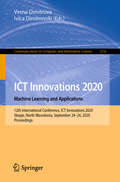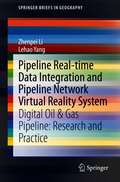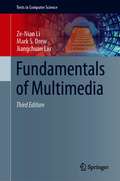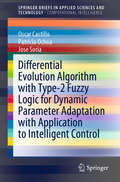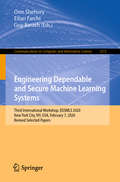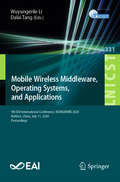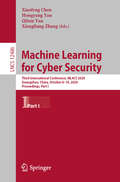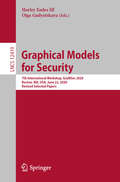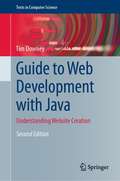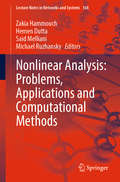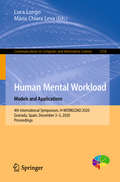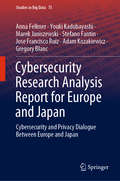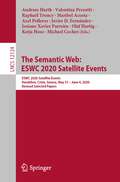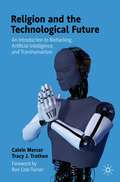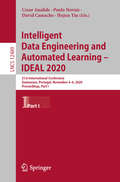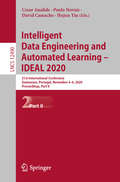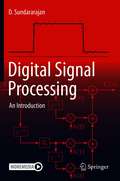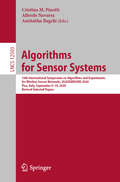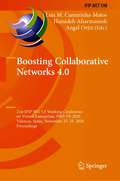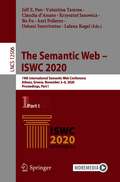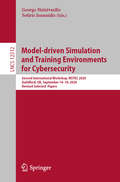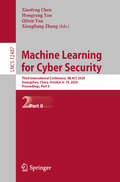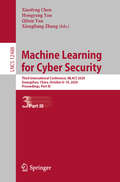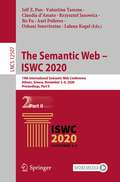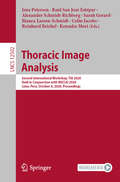- Table View
- List View
ICT Innovations 2020. Machine Learning and Applications: 12th International Conference, ICT Innovations 2020, Skopje, North Macedonia, September 24–26, 2020, Proceedings (Communications in Computer and Information Science #1316)
by Vesna Dimitrova Ivica DimitrovskiThis book constitutes the refereed proceedings of the 12th International ICT Innovations Conference, ICT Innovations 2020, held in Skopje, North Macedonia, in September 2020.The 12 full papers and 6 short papers presented were carefully reviewed and selected from 60 submissions. The focal point of the volume is machine learning and applications in spheres of business, science and technology.
Pipeline Real-time Data Integration and Pipeline Network Virtual Reality System: Digital Oil & Gas Pipeline: Research and Practice (SpringerBriefs in Geography)
by Zhenpei Li Lehao YangAs the second volume of the "Digital Oil & Gas Pipeline: Research and Practice" series of monographs, this book introduces the implementation strategies, examples and technical roadmaps of two important aspects of the Digital Oil & Gas Pipeline construction: pipeline real-time data integration and pipeline network virtual reality system. Two example of pipeline real-time data integration are elaborated: integration of pipeline WebGIS (Geographic Information System) and pipeline SCADA (Supervisory Control and Data Acquisition) via OPC (OLE for Process Control) technology, integration of pipeline network virtual reality system and pipeline SCADA via OPC, JNI (Java Native Interface) and SAI (Scene Access Interface). The pipeline network virtual reality system aims for the pipeline virtual expression, interaction, and 3D visual management. It can be used for pipeline route visual design and plan, immersive pipeline industry training, remote visual supervision and control, etc. The implementation details of the pipeline network virtual reality system, including 3D pipeline and terrain modeling with X3D (Extensible 3D) technology, improving large-scene display performance and speed in the network environment using LOD (Level of Detail) technology, interaction of virtual pipeline scenes, and pipeline 3D visual monitoring, are also introduced. The knowledge and experience delivered by this book will provide useful reference for the readers from the industries of oil & gas pipeline, GIS, Virtual Reality, industrial control, etc.
Fundamentals of Multimedia (Texts in Computer Science)
by Ze-Nian Li Mark S. Drew Jiangchuan LiuPREVIOUS EDITIONThis textbook introduces the “Fundamentals of Multimedia”, addressing real issues commonly faced in the workplace. The essential concepts are explained in a practical way to enable students to apply their existing skills to address problems in multimedia. Fully revised and updated, this new edition now includes coverage of such topics as 3D TV, social networks, high-efficiency video compression and conferencing, wireless and mobile networks, and their attendant technologies. Features: presents an overview of the key concepts in multimedia, including color science; reviews lossless and lossy compression methods for image, video and audio data; examines the demands placed by multimedia communications on wired and wireless networks; discusses the impact of social media and cloud computing on information sharing and on multimedia content search and retrieval; includes study exercises at the end of each chapter; provides supplementary resources for both students and instructors at an associated website.
Differential Evolution Algorithm with Type-2 Fuzzy Logic for Dynamic Parameter Adaptation with Application to Intelligent Control (SpringerBriefs in Applied Sciences and Technology)
by Oscar Castillo Patricia Ochoa Jose SoriaThis book focuses on the fields of fuzzy logic, bio-inspired algorithm, especially the differential evolution algorithm and also considering the fuzzy control area. The main idea is that these two areas together can help solve various control problems and to find better results. In this book, the authors test the proposed method using five benchmark control problems. First, the water tank, temperature, mobile robot, and inverted pendulum controllers are considered. For these 4 problems, experimentation was carried out using a Type-1 fuzzy system and an Interval Type-2 system. The last control problem was the D.C. motor, for which the experiments were performed with Type-1, Interval Type-2, and Generalized Type-2 fuzzy systems. When we use fuzzy systems combined with the differential evolution algorithm, we can notice that the results obtained in each of the controllers are better and with increasing uncertainty, the results are even better. For this reason, the authors consider in this book the proposed method using fuzzy systems and the differential evolution algorithm to improve the fuzzy controllers’ behavior in complex control problems.
Engineering Dependable and Secure Machine Learning Systems: Third International Workshop, EDSMLS 2020, New York City, NY, USA, February 7, 2020, Revised Selected Papers (Communications in Computer and Information Science #1272)
by Onn Shehory Eitan Farchi Guy BarashThis book constitutes the revised selected papers of the Third International Workshop on Engineering Dependable and Secure Machine Learning Systems, EDSMLS 2020, held in New York City, NY, USA, in February 2020. The 7 full papers and 3 short papers were thoroughly reviewed and selected from 16 submissions. The volume presents original research on dependability and quality assurance of ML software systems, adversarial attacks on ML software systems, adversarial ML and software engineering, etc.
Mobile Wireless Middleware, Operating Systems and Applications: 9th EAI International Conference, MOBILWARE 2020, Hohhot, China, July 11, 2020, Proceedings (Lecture Notes of the Institute for Computer Sciences, Social Informatics and Telecommunications Engineering #331)
by Wuyungerile Li Dalai TangThis book constitutes the refereed conference proceedings of the 9th International Conference on Mobile Wireless Middleware, Operating Systems and Applications, MOBILWARE 2020, held in Hohhot, China, in July 2020. Due to COVID-19 pandemic the conference was held virtually. The 21 revised full papers were reviewed and selected from 69 submissions and are organized in tracks on MobilWare; Big data, data mining and artificial intelligence workshop; Blockchain and internet of things workshop.
Machine Learning for Cyber Security: Third International Conference, ML4CS 2020, Guangzhou, China, October 8–10, 2020, Proceedings, Part I (Lecture Notes in Computer Science #12486)
by Xiaofeng Chen Hongyang Yan Qiben Yan Xiangliang ZhangThis three volume book set constitutes the proceedings of the Third International Conference on Machine Learning for Cyber Security, ML4CS 2020, held in Xi’an, China in October 2020.The 118 full papers and 40 short papers presented were carefully reviewed and selected from 360 submissions. The papers offer a wide range of the following subjects: Machine learning, security, privacy-preserving, cyber security, Adversarial machine Learning, Malware detection and analysis, Data mining, and Artificial Intelligence.
Graphical Models for Security: 7th International Workshop, GraMSec 2020, Boston, MA, USA, June 22, 2020, Revised Selected Papers (Lecture Notes in Computer Science #12419)
by Harley Eades III Olga GadyatskayaThis book constitutes the proceedings of the 7th International Workshop on Graphical Models for Security, GramSec 2020, which took place on June 22, 2020. The workshop was planned to take place in Boston, MA, USA but changed to a virtual format due to the COVID-19 pandemic. The 7 full and 3 short papers presented in this volume were carefully reviewed and selected from 14 submissions. The papers were organized in topical sections named: attack trees; attacks and risks modelling and visualization; and models for reasoning about security.
Guide to Web Development with Java: Understanding Website Creation (Texts in Computer Science)
by Tim DowneyThis comprehensive Guide to Web Development with Java introduces the readers to the three-tiered, Model-View-Controller architecture by using Spring JPA, JSPs, and Spring MVC controllers. These three technologies use Java, so that a student with a background in programming will be able to master them with ease, with the end result of being able to create web applications that use MVC, validate user input,and save data to a database.Topics and features:• Presents web development topics in an accessible, easy-to-follow style, focusing on core information first, and allowing the reader to gain basic understanding before moving forwards• Contains many helpful pedagogical tools for students and lecturers, such as questions and exercises at the end of each chapter, detailed illustrations, chapter summaries, and a glossary• Uses existing powerful technologies that are freely available on the web to speed up web development, such as Spring Boot, Spring MVC, Spring JPA, Hibernate, JSP, JSTL, and Java 1.8• Discusses HTML, HTML forms, and Cascading Style Sheets• Starts with the simplest technology for web development (JSP) and gradually introduces the reader to more complex topics• Introduces core technologies from the outset, such as the Model-View-Controller architecture• Includes examples for accessing common web services• Provides supplementary examples and tutorials
Nonlinear Analysis: Problems, Applications and Computational Methods (Lecture Notes in Networks and Systems #168)
by Zakia Hammouch Hemen Dutta Said Melliani Michael RuzhanskyThis book is a collection of original research papers as proceedings of the 6th International Congress of the Moroccan Society of Applied Mathematics organized by Sultan Moulay Slimane University, Morocco, during 7th–9th November 2019. It focuses on new problems, applications and computational methods in the field of nonlinear analysis. It includes various topics including fractional differential systems of various types, time-fractional systems, nonlinear Jerk equations, reproducing kernel Hilbert space method, thrombin receptor activation mechanism model, labour force evolution model, nonsmooth vector optimization problems, anisotropic elliptic nonlinear problem, viscous primitive equations of geophysics, quadratic optimal control problem, multi-orthogonal projections and generalized continued fractions. The conference aimed at fostering cooperation among students, researchers and experts from diverse areas of applied mathematics and related sciences through fruitful deliberations on new research findings. This book is expected to be resourceful for researchers, educators and graduate students interested in applied mathematics and interactions of mathematics with other branches of science and engineering.
Human Mental Workload: 4th International Symposium, H-WORKLOAD 2020, Granada, Spain, December 3–5, 2020, Proceedings (Communications in Computer and Information Science #1318)
by Luca Longo Maria Chiara LevaThis book constitutes the refereed proceedings of the 4th International Symposium on Human Mental Workload: Models and Applications, H-WORKLOAD 2020, held in Granda, Spain*, in December 2020.The volume presents one keynote paper as well as 13 revised full papers, which were carefully reviewed and selected from 22 submissions. The papers are organized in two topical sections on models and applications.*The conference was held virtually due to the COVID-19 pandemic.
Cybersecurity Research Analysis Report for Europe and Japan: Cybersecurity and Privacy Dialogue Between Europe and Japan (Studies in Big Data #75)
by Anna Felkner Youki Kadobayashi Marek Janiszewski Stefano Fantin Jose Francisco Ruiz Adam Kozakiewicz Gregory BlancThis book contains the key findings related to cybersecurity research analysis for Europe and Japan collected during the EUNITY project. A wide-scope analysis of the synergies and differences between the two regions, the current trends and challenges is provided. The survey is multifaceted, including the relevant legislation, policies and cybersecurity agendas, roadmaps and timelines at the EU and National levels in Europe and in Japan, including the industry and standardization point of view, identifying and prioritizing the joint areas of interests. Readers from both industry and academia in the EU or Japan interested in entering international cybersecurity cooperation with each other or adding an R&D aspect to an existing one will find it useful in understanding the legal and organizational context and identifying most promising areas of research. Readers from outside EU and Japan may compare the findings with their own cyber-R&D landscape or gain context when entering those markets.
The Semantic Web: ESWC 2020 Satellite Events, Heraklion, Crete, Greece, May 31 – June 4, 2020, Revised Selected Papers (Lecture Notes in Computer Science #12124)
by Valentina Presutti Raphaël Troncy Olaf Hartig Katja Hose Maribel Acosta Andreas Harth Michael Cochez Axel Polleres Javier D. Fernández Josiane Xavier ParreiraThis book constitutes the proceedings of the satellite events held at the 17th Extended Semantic Web Conference, ESWC 2020, in May/June 2020. The conference was planned to take place in Heraklion, Crete, Greece, but changed to an online format due to the COVID-19 pandemic. ESWC is a major venue for presenting and discussing the latest scientific results and technology innovations related to the Semantic Web, Linked Data and Knowledge Graphs. The 36 poster and demo papers, 7 PhD symposium papers, and 4 industry track papers, included in this volume were carefully reviewed and selected from 59 submissions to the poster and demo track; 11 submissions to the PhD symposium track, and 5 submissions to the Industry track.
Religion and the Technological Future: An Introduction to Biohacking, Artificial Intelligence, and Transhumanism
by Calvin Mercer Tracy J. TrothenWe live in an age of rapid technological advancement. Never before has humankind wielded so much power over our own biology. Biohacking, the attempt at human enhancement of physical, cognitive, affective, moral, and spiritual traits, has become a global phenomenon. This textbook introduces religious and ethical implications of biohacking, artificial intelligence, and other technological changes, offering perspectives from monotheistic and karmic religions and applied ethics. These technological breakthroughs are transforming our societies and ourselves fundamentally via genetic modification, tissue engineering, artificial intelligence, robotics, the merging of computer technology with human biology, extended reality, brain stimulation, and nanotechnology. The book also considers the extreme possibilities of mind uploading, cryonics, and superintelligence. Chapters explore some of the political, economic, sociological, and psychological dimensions of these advances, with bibliographies for further study and questions for discussion. The technological future is here – and it is up to us to decide its moral and religious shape.
Intelligent Data Engineering and Automated Learning – IDEAL 2020: 21st International Conference, Guimaraes, Portugal, November 4–6, 2020, Proceedings, Part I (Lecture Notes in Computer Science #12489)
by Cesar Analide Paulo Novais David Camacho Hujun YinThis two-volume set of LNCS 12489 and 12490 constitutes the thoroughly refereed conference proceedings of the 21th International Conference on Intelligent Data Engineering and Automated Learning, IDEAL 2020, held in Guimaraes, Portugal, in November 2020.*The 93 papers presented were carefully reviewed and selected from 134 submissions. These papers provided a timely sample of the latest advances in data engineering and machine learning, from methodologies, frameworks, and algorithms to applications. The core themes of IDEAL 2020 include big data challenges, machine learning, data mining, information retrieval and management, bio-/neuro-informatics, bio-inspiredmodels, agents and hybrid intelligent systems, real-world applications of intelligent techniques and AI. * The conference was held virtually due to the COVID-19 pandemic.
Intelligent Data Engineering and Automated Learning – IDEAL 2020: 21st International Conference, Guimaraes, Portugal, November 4–6, 2020, Proceedings, Part II (Lecture Notes in Computer Science #12490)
by Cesar Analide Paulo Novais David Camacho Hujun YinThis two-volume set of LNCS 12489 and 12490 constitutes the thoroughly refereed conference proceedings of the 21th International Conference on Intelligent Data Engineering and Automated Learning, IDEAL 2020, held in Guimaraes, Portugal, in November 2020.*The 93 papers presented were carefully reviewed and selected from 134 submissions. These papers provided a timely sample of the latest advances in data engineering and machine learning, from methodologies, frameworks, and algorithms to applications. The core themes of IDEAL 2020 include big data challenges, machine learning, data mining, information retrieval and management, bio-/neuro-informatics, bio-inspiredmodels, agents and hybrid intelligent systems, real-world applications of intelligent techniques and AI. * The conference was held virtually due to the COVID-19 pandemic.
Digital Signal Processing: An Introduction
by Dr. D. SundararajanThis textbook for a one semester introductory course in digital signal processing for senior undergraduate and first year graduate students in electrical and computer engineering departments is concise, highly readable, and yet provides comprehensive coverage of the topic. Each new topic is presented with examples and figures. The highly mathematical content of the topic is presented lucidly to make the learning the subject easier. Practical aspects of the subject are clearly indicated so that the student can apply the principles in real applications. Matlab programs for FIR filter design are provided as supplementary material online.
Algorithms for Sensor Systems: 16th International Symposium on Algorithms and Experiments for Wireless Sensor Networks, ALGOSENSORS 2020, Pisa, Italy, September 9–10, 2020, Revised Selected Papers (Lecture Notes in Computer Science #12503)
by Cristina M. Pinotti Alfredo Navarra Amitabha BagchiThis book constitutes revised selected papers from the 16th International Symposium on Algorithms and Experiments for Wireless Sensor Networks, ALGOSENSORS 2020, held in Pisa, Italy*, in September 2020.The 12 full papers presented in this volume were carefully reviewed and selected from 27 submissions. ALGOSENSORS is an international symposium dedicated to the algorithmic aspects of wireless networks.*The conference was held virtually due to the COVID-19 pandemic.
Boosting Collaborative Networks 4.0: 21st IFIP WG 5.5 Working Conference on Virtual Enterprises, PRO-VE 2020, Valencia, Spain, November 23–25, 2020, Proceedings (IFIP Advances in Information and Communication Technology #598)
by Luis M. Camarinha-Matos Hamideh Afsarmanesh Angel OrtizThis book constitutes the refereed proceedings of the 21st IFIP WG 5.5 Working Conference on Virtual Enterprises, PRO-VE 2020, held in Valencia, Spain, in November 2020. The conference was held virtually.The 53 full papers were carefully reviewed and selected from 135 submissions. They provide a comprehensive overview of major challenges and recent advances in various domains related to the digital transformation and collaborative networks and their applications with a strong focus on the following areas related to the main theme of the conference: collaborative business ecosystems; collaborative business models; collaboration platform; data and knowledge services; blockchain and knowledge graphs; maintenance, compliance and liability; digital transformation; skills for organizations of the future; collaboration in open innovation; collaboration in supply chain; simulation and analysis in collaborative systems; product and service systems; collaboration impacts; boosting sustainability through collaboration in Agri-food 4.0; digital innovation hubs for digitalizing European industry; and collaborative networks for health and wellness data management.
The Semantic Web – ISWC 2020: 19th International Semantic Web Conference, Athens, Greece, November 2–6, 2020, Proceedings, Part I (Lecture Notes in Computer Science #12506)
by Bo Fu Valentina Tamma Jeff Z. Pan Claudia D’Amato Krzysztof Janowicz Axel Polleres Oshani Seneviratne Lalana KagalThe two volume set LNCS 12506 and 12507 constitutes the proceedings of the 19th International Semantic Web Conference, ISWC 2020, which was planned to take place in Athens, Greece, during November 2-6, 2020. The conference changed to a virtual format due to the COVID-19 pandemic. The papers included in this volume deal with the latest advances in fundamental research, innovative technology, and applications of the Semantic Web, linked data, knowledge graphs, and knowledge processing on the Web. They were carefully reviewed and selected for inclusion in the proceedings as follows: Part I: Features 38 papers from the research track which were accepted from 170 submissions; Part II: Includes 22 papers from the resources track which were accepted from 71 submissions; and 21 papers in the in-use track, which had a total of 46 submissions.
Model-driven Simulation and Training Environments for Cybersecurity: Second International Workshop, MSTEC 2020, Guildford, UK, September 14–18, 2020, Revised Selected Papers (Lecture Notes in Computer Science #12512)
by George Hatzivasilis Sotiris IoannidisThis book constitutes the refereed post-conference proceedings of the Second International Workshop on Model-Driven Simulation and Training Environments for Cybersecurity, MSTEC 2020, held in Guildford, UK, in September 2020 in conjunction with the 24th European Symposium on Research in Computer Security, ESORICS 2020. The conference was held virtually due to the COVID-19 pandemic. The MSTEC Workshop received 20 submissions from which 10 full papers were selected for presentation. The papers are grouped in thematically on: cyber security training modelling; serious games; emulation & simulation studies; attacks; security policies.
Machine Learning for Cyber Security: Third International Conference, ML4CS 2020, Guangzhou, China, October 8–10, 2020, Proceedings, Part II (Lecture Notes in Computer Science #12487)
by Xiaofeng Chen Hongyang Yan Qiben Yan Xiangliang ZhangThis three volume book set constitutes the proceedings of the Third International Conference on Machine Learning for Cyber Security, ML4CS 2020, held in Xi’an, China in October 2020.The 118 full papers and 40 short papers presented were carefully reviewed and selected from 360 submissions. The papers offer a wide range of the following subjects: Machine learning, security, privacy-preserving, cyber security, Adversarial machine Learning, Malware detection and analysis, Data mining, and Artificial Intelligence.
Machine Learning for Cyber Security: Third International Conference, ML4CS 2020, Guangzhou, China, October 8–10, 2020, Proceedings, Part III (Lecture Notes in Computer Science #12488)
by Xiangliang Zhang Xiaofeng Chen Hongyang Yan Qiben YanThis three volume book set constitutes the proceedings of the Third International Conference on Machine Learning for Cyber Security, ML4CS 2020, held in Xi’an, China in October 2020.The 118 full papers and 40 short papers presented were carefully reviewed and selected from 360 submissions. The papers offer a wide range of the following subjects: Machine learning, security, privacy-preserving, cyber security, Adversarial machine Learning, Malware detection and analysis, Data mining, and Artificial Intelligence.
The Semantic Web – ISWC 2020: 19th International Semantic Web Conference, Athens, Greece, November 2–6, 2020, Proceedings, Part II (Lecture Notes in Computer Science #12507)
by Bo Fu Valentina Tamma Jeff Z. Pan Claudia D’Amato Krzysztof Janowicz Axel Polleres Oshani Seneviratne Lalana KagalThe two volume set LNCS 12506 and 12507 constitutes the proceedings of the 19th International Semantic Web Conference, ISWC 2020, which was planned to take place in Athens, Greece, during November 2-6, 2020. The conference changed to a virtual format due to the COVID-19 pandemic. The papers included in this volume deal with the latest advances in fundamental research, innovative technology, and applications of the Semantic Web, linked data, knowledge graphs, and knowledge processing on the Web. They were carefully reviewed and selected for inclusion in the proceedings as follows: Part I: Features 38 papers from the research track which were accepted from 170 submissions; Part II: Includes 22 papers from the resources track which were accepted from 71 submissions; and 21 papers in the in-use track, which had a total of 46 submissions.
Thoracic Image Analysis: Second International Workshop, TIA 2020, Held in Conjunction with MICCAI 2020, Lima, Peru, October 8, 2020, Proceedings (Lecture Notes in Computer Science #12502)
by Jens Petersen Raúl San José Estépar Alexander Schmidt-Richberg Sarah Gerard Bianca Lassen-Schmidt Colin Jacobs Reinhard Beichel Kensaku MoriThis book constitutes the proceedings of the Second International Workshop on Thoracic Image Analysis, TIA 2020, held in Lima, Peru, in October 2020. Due to COVID-19 pandemic the conference was held virtually. COVID-19 infection has brought a lot of attention to lung imaging and the role of CT imaging in the diagnostic workflow of COVID-19 suspects is an important topic. The 14 full papers presented deal with all aspects of image analysis of thoracic data, including: image acquisition and reconstruction, segmentation, registration, quantification, visualization, validation, population-based modeling, biophysical modeling (computational anatomy), deep learning, image analysis in small animals, outcome-based research and novel infectious disease applications.
